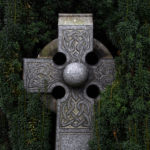We run our website the way we wished the whole internet worked: we provide high quality original content with no ads. We are funded solely by your direct support. Please consider supporting this project.

The Cross as a Trinitarian Event
On Calvary, the all-holy God fully identified with sinners, suffering the consequences of our sin as though he himself were guilty. While God is never culpable for the evil he allows, he nevertheless assumes responsibility for it by fully identifying with those free agents who are in fact culpable.
While the Son alone suffered as the “atoning sacrifice” for the sin of the whole world (1 Jn 2:2), the crucifixion was, in fact, a Trinitarian event. Indeed, some theologians have argued that the crucifixion is the ultimate foundation for the doctrine of the Trinity. The Trinity is the presupposition of revelation of God on the cross, but we have to reflect on the manner in which the entire Trinity was involved in the cross. This discloses the manner in which the entire Trinity assumes responsibility for all that comes to pass.
To begin, it was the love that all three Persons of the Trinity share for the lost world that led Jesus to offer himself up to violent agents, according to the will of the Father, through “the eternal Spirit” (Heb 9:14). In the words of Moltmann,
… what happened on the cross must be understood as an event between God and the Son of God. In the action of the Father in delivering up his Son to suffering and to a godless death, God was acting in himself. … God overcomes himself, God passes judgment on himself, God takes the judgment on the sin of man upon himself. He assigns to himself the fate that men should by rights endure. The cross of Jesus … therefore reveals a change in God, a stasis within the Godhead …[1]
The “stasis” that Moltmann believes took place within the Godhead when the Father abandoned the Son amounted to an actual enmity that divided the Father and the Son on the cross. However, I would argue that if God’s eternal nature is perfect, other-oriented love (1 Jn 4:8; cf., 3:16), then even the slightest interruption of this love would entail nothing less than the dissolution of God.
Let me propose an alternative. This impossible conclusion is avoided if we simply remember that all three Persons of the Trinity entered into this suffering out of the perfect love they have for humanity, which is reflective of the perfect love they eternally share with one another.
Hence, while the experience of love between the Father and Son was temporarily interrupted, the God-defining love that eternally unites them and that brought them to this horrific experience was not. Indeed, the act of God experiencing his own antithesis in the God-forsakenness of the cross now can be understood to be the supreme expression of the perfect love that unites them. And this is precisely why I argue that the cross is that revelation of God beyond which none greater can be conceived.
Once we make this slight, but nevertheless significant, modification of Moltmann’s view, we can wholeheartedly embrace his conclusion that the suffering involved in the Crucifixion involved the entire Trinity. “In the passion of the Son,” he writes, “the Father himself suffers the pains of abandonment. In the death of the Son, death comes upon God himself, and the Father suffers the death of his Son in his love for forsaken man.”[2]
God’s accommodating, sin-bearing activity reveals God’s eternal essence because in accommodating humanity’s limitations and failings, the triune God was not doing something that was foreign to Godself. To the contrary, the humble, other-oriented love that is revealed when God stoops to enter into solidarity with humans reflects, and participates in, the humble, other-oriented, self-giving love that is the eternal essence of the triune God.
Only if the cross is understood as a Trinitarian event can it be considered the unsurpassable revelation of God. The sin-bearing suffering of the Son perfectly reveals the triune God only because this suffering is shared by the triune God. If the Son alone suffered, his suffering would disclose nothing about the Father and Spirit. Indeed, if the Son alone suffered, it would call into question the authenticity of the love of the Father and Spirit for the Son, for how can the suffering of a beloved not produce equally intense suffering in the lover?
If we grant that all three divine Persons were in their own distinct ways involved in the suffering of the cross, and if we grant that this suffering was because the Son was assuming responsibility for the sin of the world, as though he was guilty of it, then it follows that all three divine Persons were, in their own way, suffering because they were also assuming responsibility for the sin of the world. Stated otherwise, the Son’s humble, other-oriented act of appearing as though he were guilty of committing crimes that he merely allowed reveals the triune God only because this act is shared, and suffered, by the Father and Spirit as well.
[1] Moltmann, The Crucified God, 192-3.
[2] Moltmann, ibid., 192.
Photo credit: August Brill via Visual hunt / CC BY
Category: General
Tags: Cross, Cruciform Theology, Jürgen Moltmann, Trinity
Topics: Attributes and Character, Trinity
Related Reading

Crucifying Transcendence
The classical view of God’s transcendence in theology is in large borrowed from a major strand within Hellenistic philosophy. In sharp contrast to ancient Israelites, whose conception of God was entirely based on their experience of God acting dynamically and in self-revelatory ways in history, the concept of God at work in ancient Greek philosophy…

Final Thoughts on Copan’s Critique of Crucifixion of the Warrior God
I want to sincerely thank Paul Copan for his well-researched critique of Crucifixion of the Warrior God (CWG) that I’ve been responding to over the last several weeks. He exposed areas in my work that needed buttressing up and/or clarifying, and he has helped introduce my ideas into the theological and philosophical marketplace of concepts…

The All-Too-Common Montage God
How do you picture God? It’s impossible to exaggerate the importance of a believer’s mental picture of God. The intensity of your love for God will never outrun the beauty of the God you envision in your mind. So our mental picture of God completely determines the quality of our relationship with God. In fact,…

How Much Are You Worth?
We know what something is worth to someone by what they are willing to pay for it. Consider, then, what our heavenly bridegroom was willing to pay to redeem us and make us his bride. Out of his love for us, the all-holy God was willing to do nothing less than to go to the…

The REAL Problem with Divine Violence in the OT
As I mentioned in my previous blog, while I will continue to offer video-blogs responding to questions that come in, I’m also planning on sprinkling in reflections based on my forthcoming book, Crucifixion of the Warrior God, over the next couple months. Today, I just want to state what I consider to be the real…

God Became What He is Not To Reveal What He Is
We are saved because Jesus became the curse of the law for us (Gal. 3:13). So too, the way Christ freed us from the condemnation of sin and enabled us to “become the righteousness of God” was by becoming sin for us (2 Cor. 5:21). What is more, since the curse of the law includes enslavement to…
